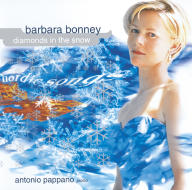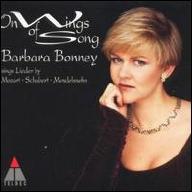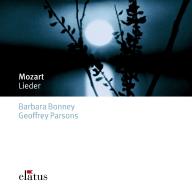Her family was not a musical one, and it was only by chance that her parents discovered she had perfect pitch and a sense of music--when she was three, they noticed that she could perfectly imitate musical noises, such as the melody that one of the household clocks chimed. When she was older, she started piano, but found that she preferred the more songful tones of the cello. It was an interest in German that led to her singing career--as a college student at the University of New Hampshire she decided to spend a year studying at the University of Salzburg. She worked a wide variety of jobs to support herself, including cooking, selling produce at a vegetable stand, and copying music, and one day a friend suggested that she audition for the famed Mozarteum orchestra there. She hadn't brought her cello overseas with her, since the costs of shipping were prohibitive, so instead she prepared a song for her audition, and was offered a position as a lieder student. Spurred on by this success, she auditioned for the Darmstadt Opera (knowing only two arias out of the entire operatic repertoire), and was given the ingenue role of Anna in Nicolai's Die Lustigen Weiber von Windsor (The Merry Wives of Windsor). During her years with the company, she learned over forty operatic roles.
In 1984, she made her Vienna State Opera debut as Sophie in Richard Strauss's Der Rosenkavalier, a role which was to become one of her most famous. Another characteristic role, that of Pamina in Mozart's Die Zauberflõte, she first undertook in her 1985 La Scala debut. In 1987, she sang Sophie in Der Rosenkavalier at Monte Carlo, which brought her to the attention of conductor Carlos Kleiber. Lucia Popp, too, greatly admired her Sophie, and when Popp relinquished the role, moving on to the Marschallin, she declared that she was passing it on to Bonney, the Sophie of the next generation. Her Met debut was in 1988, as Naiad in Strauss's Ariadne auf Naxos. During the 1990s, increasingly able to pick and choose what roles and repertoire she would sing, she began to reduce her operatic roles to a few of her special favorites, such as Pamina, Susanna (in Mozart's Le nozze di Figaro), and Ilia (in his Idomeneo), and adding a few new roles, such as Zdenka in Strauss's Arabella and Hanna Glawari (in Lehár's Die lustige Witwe [The Merry Widow]). Like Popp, she chose to drop the role of Sophie, leaving it for younger singers. This would allow her to spend more time singing lieder performances, and also to teach.
She was briefly married to baritone Hakan Hagegard. Among her recordings, her Mozart arias (London 460 571) and Schubert lieder (Teldec 90873) capture her voice and singing quite well. ~ Ann Feeney, Rovi














